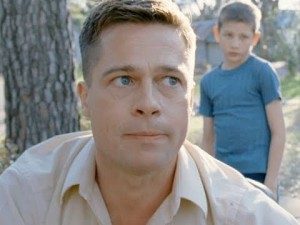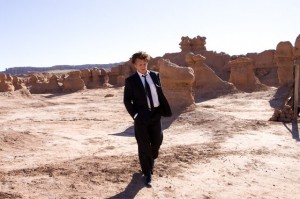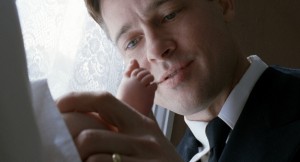The Tree of Life
 Is there a significant difference between getting your money’s worth and getting too much? In terms of moviegoing, there’s two ways of dealing with that thought; Since you’ve paid, you have to get as much as you can out of the experience. Or, since you’ve paid, it’s your time and your money, and torturing yourself with more than you’d like is unnecessary, and it’s precisely because it’s free that you should get up and leave when you want. When I was younger, I believed in the former, and sat through some films that would permanently harm a normal human (Blankman, Destiny Turns on the Radio, Car 54, Where are You?, The Jerky Boys, North). The turning point was probably Peter Greenaway’s The Pillow Book, where, accompanied by a friend who was often likely to walk out of a movie, we had had enough of what the movie could give us. Not that the film was bad, mind you, it’s just that we’d enjoyed as much as we could of what the movie was doing well (and Greenaway can be quite repetitive), and another 20 minutes would spoil it.
Is there a significant difference between getting your money’s worth and getting too much? In terms of moviegoing, there’s two ways of dealing with that thought; Since you’ve paid, you have to get as much as you can out of the experience. Or, since you’ve paid, it’s your time and your money, and torturing yourself with more than you’d like is unnecessary, and it’s precisely because it’s free that you should get up and leave when you want. When I was younger, I believed in the former, and sat through some films that would permanently harm a normal human (Blankman, Destiny Turns on the Radio, Car 54, Where are You?, The Jerky Boys, North). The turning point was probably Peter Greenaway’s The Pillow Book, where, accompanied by a friend who was often likely to walk out of a movie, we had had enough of what the movie could give us. Not that the film was bad, mind you, it’s just that we’d enjoyed as much as we could of what the movie was doing well (and Greenaway can be quite repetitive), and another 20 minutes would spoil it.
 What then would the teenage me make of Terrence Malick’s The Tree of Life, which is a whole movie + 20%? Certainly there’s enough whispered voiceover of biblical scripture to last until at least, well, another Terrence Malick movie (current ETA? 2039). And while there’s not much of a story in The Tree of Life, mostly very specific incidents in a child’s life that explain who this person will grow up to be (life’s first experiences of every clichéd type), it’s probably even more than 120% of a movie because the film is dictated to us. It’s not just the copious narration, which Malick fans have long been accustomed to (Badlands, Days of Heaven, The Thin Red Line), but the fact that it’s an entire movie without reaction shots. Brad Pitt’s father character, first nameless, behind thick cartoon glasses, with Pitt curling his lips in (one of his acting crutches) to give us the impression of a tough, but simplistic hick , talks to his sons, dictating their lives to them. We don’t know how they feel about it, because Malick never cuts to them. It’s not just Pitt’s character, though; there are no reactions from anyone until the movie is nearly over*.
What then would the teenage me make of Terrence Malick’s The Tree of Life, which is a whole movie + 20%? Certainly there’s enough whispered voiceover of biblical scripture to last until at least, well, another Terrence Malick movie (current ETA? 2039). And while there’s not much of a story in The Tree of Life, mostly very specific incidents in a child’s life that explain who this person will grow up to be (life’s first experiences of every clichéd type), it’s probably even more than 120% of a movie because the film is dictated to us. It’s not just the copious narration, which Malick fans have long been accustomed to (Badlands, Days of Heaven, The Thin Red Line), but the fact that it’s an entire movie without reaction shots. Brad Pitt’s father character, first nameless, behind thick cartoon glasses, with Pitt curling his lips in (one of his acting crutches) to give us the impression of a tough, but simplistic hick , talks to his sons, dictating their lives to them. We don’t know how they feel about it, because Malick never cuts to them. It’s not just Pitt’s character, though; there are no reactions from anyone until the movie is nearly over*.
 Information is kept to a minimum, as per Malick’s norm. He famously had to add the narration to Days of Heaven because he’d cut out so much story that the movie no longer made any sense. And the perspective he has his leads narrate from is always the naïve POV, so wild-eyed and childlike is somehow acceptable. However, this tactic really only worked in Badlands, because Sissy Spacek’s character is rather matter-of-factly surprised at her Bonnie and Clyde predicament, and her narration is like simplistic ironic commentary on itself, and becomes funny. In The Tree of Life, the narration isn’t even of much help. We start with Sean Penn’s nameless character (son of Pitt) looking back on his childhood and it’s not even clear which one of the three children he’s supposed to be (I had to check the credits just to be sure). And he tells us he’s thinking about his brother who died when he was 19, but doesn’t tell us how. So when there’s a mid-film drowning (there’s no such thing as spoilers in this movie, the events accumulate, they’re individually meaningless), the hint is that it’s one of Pitt’s children, but I don’t think it is, at least with what we’re told. His wife (Jessica Chastain) seems genuinely upset, but it’s very difficult to figure out which child dies, exactly.
Information is kept to a minimum, as per Malick’s norm. He famously had to add the narration to Days of Heaven because he’d cut out so much story that the movie no longer made any sense. And the perspective he has his leads narrate from is always the naïve POV, so wild-eyed and childlike is somehow acceptable. However, this tactic really only worked in Badlands, because Sissy Spacek’s character is rather matter-of-factly surprised at her Bonnie and Clyde predicament, and her narration is like simplistic ironic commentary on itself, and becomes funny. In The Tree of Life, the narration isn’t even of much help. We start with Sean Penn’s nameless character (son of Pitt) looking back on his childhood and it’s not even clear which one of the three children he’s supposed to be (I had to check the credits just to be sure). And he tells us he’s thinking about his brother who died when he was 19, but doesn’t tell us how. So when there’s a mid-film drowning (there’s no such thing as spoilers in this movie, the events accumulate, they’re individually meaningless), the hint is that it’s one of Pitt’s children, but I don’t think it is, at least with what we’re told. His wife (Jessica Chastain) seems genuinely upset, but it’s very difficult to figure out which child dies, exactly.
 And there’s the additional issue of bookending the movie with absolutely stunning visuals, more otherworldly than Malick is known for, as we’ve gone back to The Big Bang, and then a segment from Terrence Malick’s Walking With Dinosaurs, and on and on. This has nothing to do with the story at hand, and getting impatient is a perfectly reasonable reaction. Individually, each shot is astonishing, but it’s quite the silly way to show us how “life began” if you then cut from standard marking points of evolution directly to the 1950s (I think, timelines are not clear, but no Malick films are told in the “now” as if he didn’t understand the “now”).
And there’s the additional issue of bookending the movie with absolutely stunning visuals, more otherworldly than Malick is known for, as we’ve gone back to The Big Bang, and then a segment from Terrence Malick’s Walking With Dinosaurs, and on and on. This has nothing to do with the story at hand, and getting impatient is a perfectly reasonable reaction. Individually, each shot is astonishing, but it’s quite the silly way to show us how “life began” if you then cut from standard marking points of evolution directly to the 1950s (I think, timelines are not clear, but no Malick films are told in the “now” as if he didn’t understand the “now”).
Now I’d certainly watch a Malification of heaven, which is where The Tree of Life seems to be going at times, but his obsession with extraneous visuals suggests he might be better off making another sequel to Koyaanisqatsi, so he doesn’t have to bother with talking or people. His focus on giving us the most striking establishing shot possible (a swarm of bees move like a kite, a child in his grave shot below the dirt and from the side) is similar to what Tarsem Singh did with The Fall, it was that neither filmmaker knew what to do after the initial marvel had disappeared. It’s as if Malick isn’t a filmmaker, but the greatest storyboard artist of all time.
 And yet, despite all of these problems, or probably because of them The Tree of Life does tell a coherent story in its own way. We see the progression of Brad Pitt’s character from a modest man who loves his wife and children to a nasty, abusive monster, and it’s all basically told from his son Jack’s perspective, despite the fact that Jack doesn’t have much dialogue. It sneaks up on you, all of the flashy visuals that could double as outtakes from 2001: A Space Odyssey or Enter the Void (minus the strobing effects, but with an equal amount of self-indulgence) are almost a trick to get you to roll your eyes at the pretension, so your expectations will hit bottom. Scenes build up seemingly without meaning, until it becomes clear who Jack’s father has become, and you find yourself sympathizing with both sides, learning how parents find ways to alienate themselves from their children just by taking on their natural roles. It’s oddly profound for a movie that is so nakedly sloppy and self-important.
And yet, despite all of these problems, or probably because of them The Tree of Life does tell a coherent story in its own way. We see the progression of Brad Pitt’s character from a modest man who loves his wife and children to a nasty, abusive monster, and it’s all basically told from his son Jack’s perspective, despite the fact that Jack doesn’t have much dialogue. It sneaks up on you, all of the flashy visuals that could double as outtakes from 2001: A Space Odyssey or Enter the Void (minus the strobing effects, but with an equal amount of self-indulgence) are almost a trick to get you to roll your eyes at the pretension, so your expectations will hit bottom. Scenes build up seemingly without meaning, until it becomes clear who Jack’s father has become, and you find yourself sympathizing with both sides, learning how parents find ways to alienate themselves from their children just by taking on their natural roles. It’s oddly profound for a movie that is so nakedly sloppy and self-important.
* Near the end there’s a very misguided scene that does feature visible reactions, as all of the characters from various time periods meet each other on the beach and embrace. Perhaps it was supposed to be a sort of House of Games-style peek behind the curtain, but it plays like outtakes from the wrap party.



